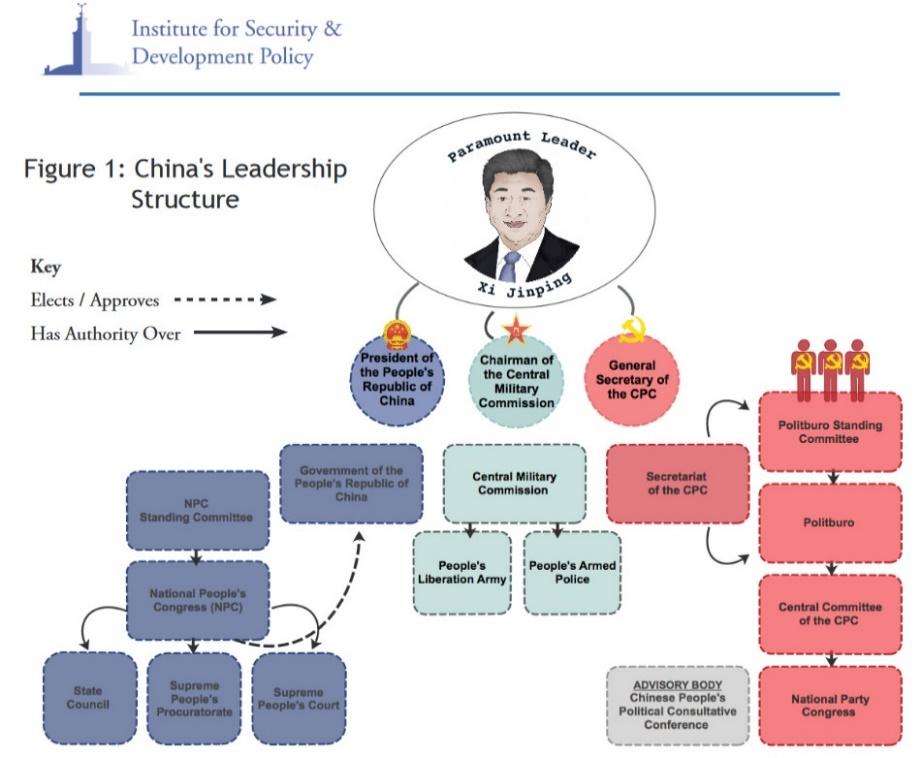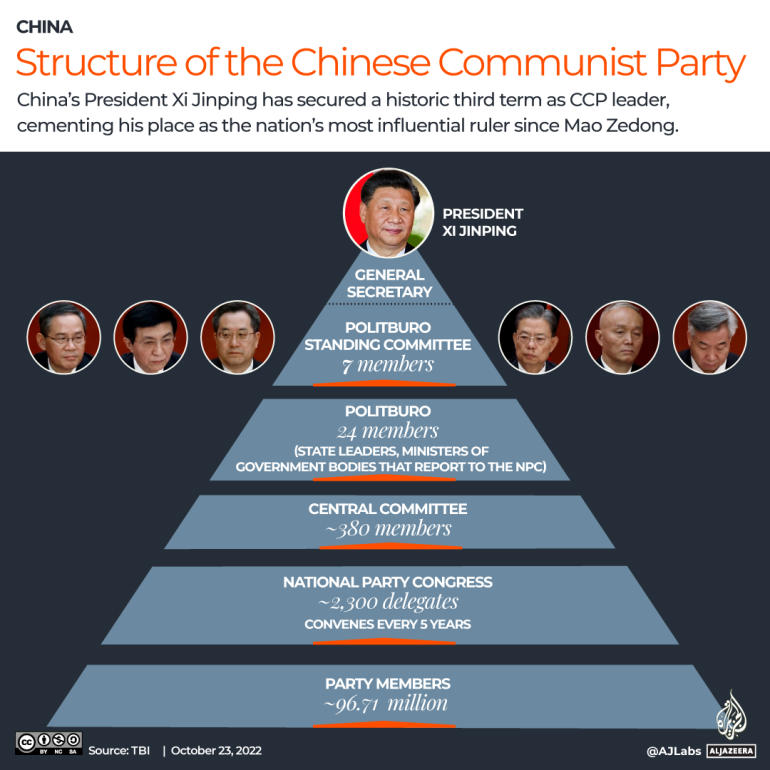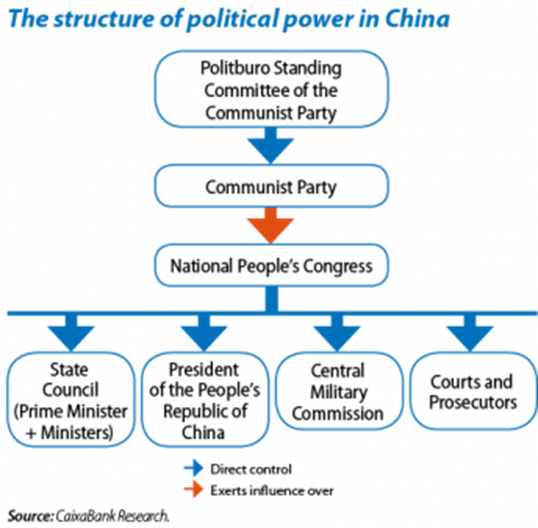Introduction
The Chinese political system has been the subject of much debate in recent years. It is often described as authoritarian, with the government wielding immense power and influence over its citizens. However, aspects of the system suggest more democratic elements, such as citizens’ ability to vote for the president. To evaluate the extent to which China’s political system is authoritarian, it is necessary to examine the various aspects of the system and how they are implemented. Exploring aspects, such as a one-party rule, government structure, leadership, political ideology, elections, and human rights, helps to analyze the extent to which China can be considered authoritarian.
Factors Making China’s Political System Partially Authoritarian
One-Party Rule
One-party control contributes significantly to China’s authoritarian political structure. The Chinese Communist Party (CCP) has been the country’s sole political organization since 1949 (Zeng, 2020). It is a closed political system that tolerates no opposition and rigorously regulates the activity of rival political parties.
CCP controls the media, governs the internet, and suppresses any dissent or criticism of the government. In addition to this, it has been accused of committing violations of human rights, including the arbitrary detention and torture of political opponents. According to its control of the military, the court system, and the machinery of its own secret police, the CCP maintains its dictatorial grip on political power.
Additionally, patronage networks and extraordinary advantages for CCP members are used to uphold the one-party rule. The CCP has been able to keep control of the situation by employing patronage networks, which it uses to reward party loyalty and punish disloyal people. As a direct consequence of this, there is a cronyism and nepotism system in place, according to which party members are given preferential access to posts and resources (Huang, 2018).
The party has also been accused of giving its members exceptional privileges, such as access to premium housing and educational opportunities. This accusation has been leveled against the party on several occasions. By limiting citizens’ ability to engage in the political process, these elements contribute to China’s authoritarian political system.
Eventually, the legislation is used to ensure compliance with the rule. In China, the judicial system is seen to be a weapon of the party, and legislation is used to restrict the rights of individuals and stifle any criticism of the government. The party can also use the legal system to its advantage because it can make laws that are favorable to it (Sinkkonen, 2021). As a consequence of this, the party is able to maintain its control and influence over the population since any dissent to the party’s programs is promptly silenced.
Leadership
The CPP has the preponderance of power in China’s political system. The CCP is China’s only ruling party responsible for setting policies and steering the country’s future. The CCP General Secretary, Xi Jinping, is China’s most powerful political figure, and the party’s other leaders follow his example, as seen in Figure 1 (Nathan, 2020).
The CCP is also the country’s only recognized political party, limiting the public’s ability to participate in the political process. The Chinese government was designed so that power would be centralized in the hands of the CCP and its leaders. The Politburo Standing Committee, a group of seven members chosen by the CCP, stands at the pinnacle of Chinese governance (Chen & Zhang, 2021).
This committee is in charge of making critical policy decisions and can overrule any decisions made by lower levels of government. The central government can also appoint and remove local officials, and the party is heavily involved in the selection process. This ensures that the CCP keeps control of the government and its policies.

The Chinese political system is heavily based on ideological control. The CCP has a set of core concepts and beliefs that it seeks to impose on the population through education, propaganda, and censorship (Zhang, 2018). The CCP has also endeavored to promote its ideas and ideals through campaigns like “China Dream” and “New Socialism with Chinese Characteristics.” These events attempted to instill a sense of national identity and allegiance to the CCP and its philosophy. The leadership’s ability to regulate public image and shape public discourse has been crucial in establishing authoritarian authority.
Government Structure
The government structure significantly impacts how autocratic a political system is. The government of China is a one-party system, with the CCP dominating all government sectors, as portrayed in Figure 2. CCP is the sole source of authority and influence in the country, and as such, it dictates both policies and laws without consulting the general population (Situ et al., 2018).

Due to the CCP’s centralized power structure, the government of this nation is considered authoritarian. This gives the CCP enormous control over the people who live in the country. The CCP has established a hierarchical structure within the government, with the party’s Central Committee and Politburo at the top. These two entities create policies and choices that influence the entire country (Truex, 2018).
The Central Committee comprises the party’s most influential members and makes economic, ideological, and political decisions. The Politburo comprises the party’s senior leaders and puts the Central Committee’s decisions into action. This structure grants the CCP extensive influence over the government.
Finally, the CCP controls a large number of departments and agencies. This category includes several ministries and commissions, including the National People’s Congress, the Supreme People’s Court, and the Supreme People’s Procuratorate (Zeng, 2020). These departments and agencies are responsible for making the CCP’s decisions and implementing policies. As a result, the CCP can wield considerable power over the government.
Political Ideology
Political ideology is an essential aspect in deciding how autocratic a country is. In China, the governing Communist Party has long had a monopoly on power and has been able to control the country’s political discourse for decades, as seen in Figure 3. As a result, a state ideology based on authoritarianism has been implemented (Ginsburg, 2020).

This concept is represented in several areas of Chinese society, such as the high focus on law and order, the lack of an independent judiciary, and limits on civil freedoms. Moreover, the ruling party enjoys a monopoly on power, allowing it to implement policies frequently viewed as repressive and undemocratic by foreign observers.
China’s political philosophy has also been significantly impacted by its history and culture. The Chinese Communist Party is based on the Soviet Union’s Marxist-Leninist philosophy, which it has modified to meet the demands of the Chinese people (Nathan, 2020). This has resulted in adopting a kind of socialism that emphasizes economic and social growth and a significant emphasis on state control and the suppression of criticism. This has been used to excuse the Chinese government’s heavy-handed response to censorship and human rights violations.
Lastly, the Chinese political ideology has been strengthened by the government’s efforts to project its authority and influence in the international arena. China has constantly strived to increase its influence and authority in the global community, frequently employing economic and military strength to achieve its objectives (Sinkkonen, 2021). This has been interpreted as a strategy for maintaining its autocratic control and promoting its interests overseas. The Chinese government has also utilized political ideology to legitimize its actions in the international arena, such as its more hostile approach toward its neighbors and the acquisition of disputed territory.
Human Rights
Human rights are crucial in deciding whether a political system is authoritarian. Several concerns surround human rights violations and restrictions in China. The Chinese government has a long history of repressing freedom of expression, limiting access to information, and criminalizing specific actions that it considers to threaten its rule (Ginsburg, 2020). Additionally, there have been numerous claims of forced labor, other types of exploitation, and reports of torture and harsh treatment. These concerns show disdain for human rights and reflect that China’s political system is mainly authoritarian.
The Chinese government has also been condemned for its lack of openness and failure to make itself accountable to its citizenry. It is common knowledge that the government ignores requests for information, restricts access to public records, and censors news coverage that is critical of the policies it enacts (Situ et al., 2018). Citizens’ incapacity to obtain information has a direct and negative effect on their ability to exercise their rights and take part in the democratic process. In addition, it has been argued that the fact that the government does not acknowledge and protect the rights of its citizens is proof of its authoritarian nature.
Finally, it is critical to evaluate the Chinese government’s use of censorship and monitoring to preserve control. The Chinese government has been accused of blocking the internet and utilizing surveillance technology to monitor its population (Zhang, 2018). These activities are viewed as a form of control and a breach of fundamental human rights, implying that China’s political system is mainly authoritarian. In summary, the Chinese government’s disrespect for human rights, lack of openness, and use of censorship and monitoring all lead to an essentially authoritarian political system.
Elections
Elections are critical in determining whether China is an authoritarian regime. Citizens in China can, in principle, vote for local representatives as well as the president. However, the CCP maintains tight control over the election process, and the outcomes are frequently predetermined (Fong, 2020).
Candidates are selected by the CCP using a subjective process, making it difficult for independent candidates to run for office. Because the CCP maintains control over the media, residents are unable to form well-informed opinions. This indicates that the elections are more of a formality than a genuine effort to provide citizens with a voice in the political process.
In addition, the CCP restricts the number of candidates who may run for office and places harsh limitations on independent candidates. This means that the only candidates with a realistic chance of winning are those picked by the CCP, diminishing the potential of true competition and reaching a democratic conclusion (Sinkkonen, 2021). Moreover, even if an independent candidate has enough support to run for office, they are frequently subject to limitations, such as being prohibited from running in certain districts or participating in certain debates. This is the case even if the independent candidate has enough support to run.
Lastly, the CCP controls the electoral process by determining who is eligible to vote. The CCP can exclude voters and influence the election process to ensure that only its approved candidates are elected (Chen & Zhang, 2021). This means that the CCP may determine the outcome of elections before they even take place, thus limiting citizens’ capacity to participate in the political process. Together, these criteria show that, while China’s political system contains some democratic components, the CCP ultimately controls the election process, limiting the opportunity for true democracy.
Conclusion
Since China’s political system has certain fundamentals of consensus, it might be partially authoritarian. The CCP has a monopoly on power and can dominate the government and political discourse in the country. Additionally, the CCP has established a rigorous hierarchical structure in the government and has employed ideological control to repress dissent and limit citizens’ rights.
Moreover, the CCP has retained control over the election process, limiting individuals’ capacity to participate in the political process. Notwithstanding these constraints, certain democratic features exist in the Chinese political system, such as the right to vote for representatives and citizens’ capacity to engage in the political process. These criteria show that, while China is not a genuinely democratic state, it does contain democratic aspects in its political structure.
References
Chen, L., & Zhang, H. (2021). Strategic authoritarianism: The political cycles and selectivity of China’s tax‐break policy. American Journal of Political Science, 65(4), 845–861. Web.
Fong, B. C. (2020). Exporting autocracy: How China’s extra-jurisdictional autocratic influence caused democratic backsliding in Hong Kong. Democratization, 28(1), 198–218. Web.
Ginsburg, T. (2020). Authoritarian international law? American Journal of International Law, 114(2), 221–260. Web.
Huang, V. G. (2018). Floating control: Examining factors affecting the management of the civil society sector in authoritarian China. Social Movement Studies, 17(4), 378–392. Web.
Nathan, A. J. (2020). The puzzle of authoritarian legitimacy. Journal of Democracy, 31(1), 158–168. Web.
Sinkkonen, E. (2021). Dynamic dictators: Improving the research agenda on autocratization and authoritarian resilience. Democratization, 28(6), 1172–1190. Web.
Situ, H., Tilt, C. A., & Seet, P.-S. (2018). The influence of the government on corporate environmental reporting in China: An authoritarian capitalism perspective. Business & Society, 59(8), 1589–1629. Web.
Truex, R. (2018). Authoritarian gridlock? Understanding the delay in the Chinese legislative system. Comparative Political Studies, 53(9), 1455–1492. Web.
Zeng, J. (2020). Artificial intelligence and China’s authoritarian governance. International Affairs, 96(6), 1441–1459. Web.
Zhang, C. (2018). Governing neoliberal authoritarian citizenship: Theorizing hukou and the changing mobility regime in China. Citizenship Studies, 22(8), 855–881. Web.
